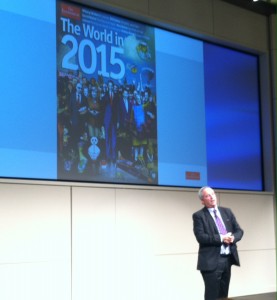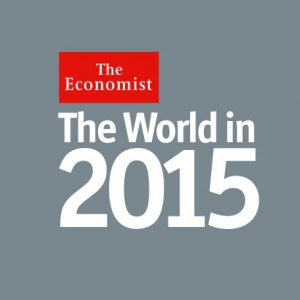
Kicking off the new year is a great time to assess what's worked and what hasn't, take inventory, check assumptions and do other things to prepare you for a fresh new year. It's also a perfect time to get a broader perspective on world events and what might happen in 2015 that will impact our customers and inform our strategies (or rewrite them).
An excellent source for such a broader perspective is Daniel Franklin, Executive Editor of The Economist, and Editor of The Economist's annual publication, "The World in 2015."
I had the privilege to hear Mr. Franklin summarize his views on what's to come in 2015, which I am happy to share with you as ten big issues to watch out for in 2015:
- New Engines of GDP Growth
Top GDP growth in the coming year will all be in developing countries in Africa and Asia. What's noteworthy is that recent engines of global growth (BRIC and CIVETS countries) are all missing from the Top 10. Even China is expected to downgrade its growth projections in 2015 to just 7% from the current 7.5%. - Nasty Economic Shocks:
- Slower Growth in China
As one of the main engines for global growth, the potential danger in China is that it slows more abruptly than expected. This contrasts with greater growth on a global level and is a concern because such a development could spark a wave of burgeoning bankruptcies in China. - Central Bank Actions
The risk is that the US Federal Reserve may start raising interest rates, which will spread economic shock waves despite the fact that it would be in response to a stronger economy and tighter labor market. And while the Bank of England may also tighten monetary policy in parallel to the Fed, China’s central bank and the European Central Bank may be under pressure to lower interest rates to combat low inflation and recession, respectively. - Euro Zone Instability
Likely political change in Greece may usher in changes in how they want to handle their debt, potentially creating pressures for Greece to leave the Euro. That development would call the whole stability of the currency system into question and open the door to many future crises.
- Slower Growth in China
- Higher Global Economic Growth
Mr. Franklin characterized this as a pleasant surprise, with slightly higher growth overall in 2015 versus 2014. The relative strength of the US economy will be one driver of that development, including the global drop in oil prices. The downside to lower oil prices will be to put pressure on Russia and Venezuela in ways that they may not be economically or politically prepared to handle. - Eye-opening numbers:
- The USA is positioned to become once again the world's largest oil producer (ahead of Saudi Arabia). This development strengthens the USA's hand in all sorts of dealings around the world, and attracts a lot of energy-intensive industries back to the US.
- The world's center of economic activity in the world is moving east. In 1980, it was in the middle of the Atlantic and now it’s over Iran and by 2050 will shift to somewhere between China and India.
- China’s outward foreign investment has grown quickly over the past 2 decades and in 2015, Chinese outward investment will overtake the high rate of investment into China from other countries.
- During 2015, China will also overtake the USA by one measure of the size of the economy – GDP at purchasing power parity. It’s a moment for thought and reflection.
- The balance of power in defense spending will shift. The countries in the Asia-Pacific region outside of China will increase their defense spending as a reaction to the rise of China. In 2015, non-China Asia will outspend the EU on defense.
- In terms of technology, 2015 is the year that tablets overtake desktops and laptops in terms of sales.
- Online advertising spending will overtake newspapers, magazines and outdoor in 2015.
- In 2015, mobile phone subscriptions will be more numerous than people on the planet.
- Facebook will overtake China in population, made even more remarkable since Facebook can’t even operate there.
- Global population profiles will shift due to falling birth rates and greater longevity. What used to look like a pyramid with many younger people on the bottom will look more like a dome in 2015 and by 2050 will look more like a pillar. This development has implications on public policy and employment policy choices now.
- The Health Care Story of 2015: Genome Sequencing
The rapid pace of genome sequencing and the many positive implications for medical research will be the big healthcare story of 2015. He believes other healthcare stories in 2015 will pale in comparison to this, including the Ebola epidemic, and new attempts by the US Congress to repeal Obamacare. - Spooky phones will surprise us.
Predictive programming is increasingly in use in phones. He envisions that during 2015, we will be simultaneously fascinated and creeped out when our own phones appear to know what we're interested in before we articulate it. And this development won't be limited to phones since it's becoming prevalent in business applications. - The coming wage shock
Global firms should expect labor costs to rise. Widening inequalities will be a catalyst for change, putting political pressure on raising minimum wages in developed economies and similar pressures in emerging markets, removing some incentives for "offshoring" labor. 2015 will be the year when the world turns a corner on all these wage pressures. - Xiaomi
The world's third-largest smartphone distributor that most people outside China have never heard of will surprise us by expanding onto the world market (marketing under the shorter name "Mi'). It’s come from nowhere in 4 years to be the biggest mobile phone maker in China, doubling revenues in the last year, and now it's expanding into India, Brazil, Mexico and expanding its staff outside of China, too. Expect competitive dynamics with Samsung, Apple and other players. - Wearable & Embedded Technology
Already a distinct trend to note, expect wearable and embedded technology to have a big impact in 2015. From RFID tags to connected devices, this development has implications across all industries. Daniel notes that it also signals a shift in focus in Silicon Valley away from current software prevalence back to its roots in hardware. - Interactive Cars
Cars that communicate with each other will also surprise us in 2015. Auto manufacturers are already working on interactive cars, and the barrier that needs to be overcome is the interoperability and standards to enable the communication.
As we interact with customers, suppliers and colleagues around the world, it's worth noting that 2015 will also be marked by the World Cup sporting events in both Rugby and Cricket.

In addition, several anniversaries will be marked during 2015, not the least of which is the centenary for The Battle of Gallipoli, a key World War I battle that had foundational implications for modern-day Turkey, Australia and New Zealand.
I found this opportunity to hear Mr. Franklin quite timely as I finish my planning for the year ahead. And since no marketer works in a vacuum, I hope you found my sharing this update helpful.
As always, thank you for following!

1 Comment
Thanks, Alison! It was truly a privilege to attend this session and very thought-provoking.
JB